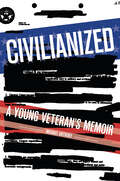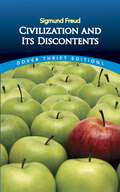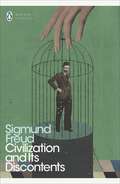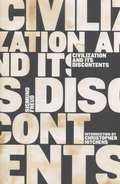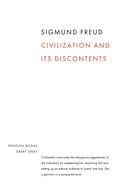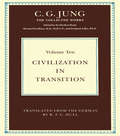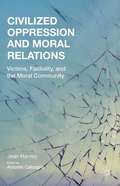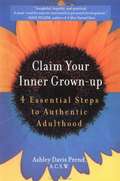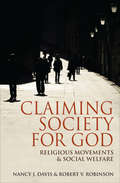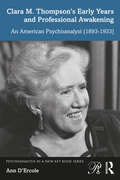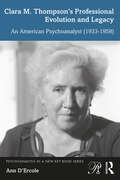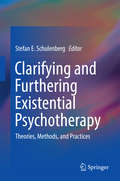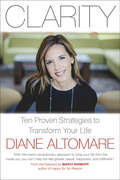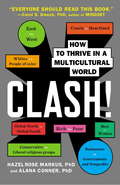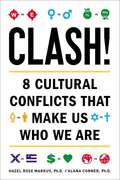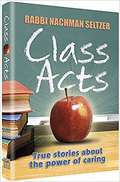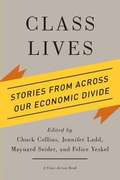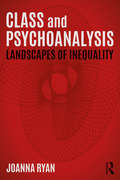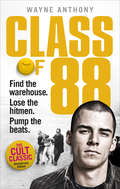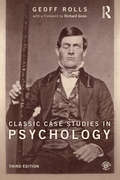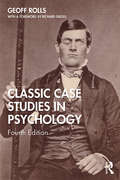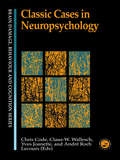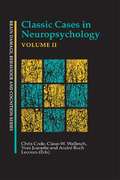- Table View
- List View
Civilianized: A Young Veteran's Memoir
by Michael AnthonyAfter twelve months of military service in Iraq, Michael Anthony stepped off a plane, seemingly happy to be home—or at least back on US soil. He was twenty-one years old, a bit of a nerd, and carrying a pack of cigarettes that he thought would be his last. Two weeks later, Michael was stoned on Vicodin, drinking way too much, and picking a fight with a very large Hell's Angel. At his wit's end, he came to an agreement with himself: If things didn't improve in three months, he was going to kill himself. Civilianized is a memoir chronicling Michael's search for meaning in a suddenly destabilized world.
Civilization and Its Discontents
by Sigmund Freud Joan RiviereThe struggle between the urgencies of instinct and the restrictions of civilization is addressed throughout the works of Sigmund Freud, and in Civilization and Its Discontents the theme is developed with particular richness and depth. This famous study explores the guilt that arises when personal desires clash with social norms, and it examines attempts to reconcile the conflict.In a sense, such guilt is among civilization's building blocks, keeping aggressive and selfish instincts within bounds. But it can also be a source of great frustration, and Freud examines at length many ways of dealing with guilt, from artistic and scientific pursuits to abuse of drink and drugs. The great psychologist offers revealing insights into the motivation behind human behavior as well as the evolution of many social institutions. This seminal study reveals the struggles to resolve conflicts and cast off guilt as spurs to the growth of civilization and culture.
Civilization and Its Discontents (Penguin Modern Classics)
by Sigmund FreudIn what remains one of his most seminal papers, Freud considers the incompatibility of civilisation and individual happiness, and the tensions between the claims of society and the individual. We all know that living in civilised groups means sacrificing a degree of personal interest, but couldn't you argue that it in fact creates the conditions for our happiness? Freud explores the arguments and counter-arguments surrounding this proposition, focusing on what he perceives to be one of society's greatest dangers; 'civilised' sexual morality. After all, doesn't repression of sexuality deeply affect people and compromise their chances of happiness?
Civilization and its Discontents
by Sigmund Freud James Strachey Christopher Hitchens Peter GayWritten in the decade before Freud's death, Civilization and Its Discontents may be his most famous and most brilliant work. It has been praised, dissected, lambasted, interpreted, and reinterpreted. Originally published in 1930, it seeks to answer several questions fundamental to human society and its organization: What influences led to the creation of civilization? Why and how did it come to be? What determines civilization's trajectory? Freud's theories on the effect of the knowledge of death on human existence and the birth of art are central to his work. Of the various English translations of Freud's major works to appear in his lifetime, only Norton's Standard Edition, under the general editorship of James Strachey, was authorized by Freud himself. This new edition includes both an introduction by the renowned cultural critic and writer Christopher Hitchens as well as Peter Gay's classic biographical note on Freud.
Civilization and its Discontents
by Sigmund Freud James StracheyFreud gives his views on the conflict between the individual's claim to freedom and society's demands.
Civilization and its Discontents (Penguin Great Ideas)
by Sigmund FreudThroughout history, some books have changed the world. They have transformed the way we see ourselves - and each other. They have inspired debate, dissent, war and revolution. They have enlightened, outraged, provoked and comforted. They have enriched lives - and destroyed them. Now Penguin brings you the works of the great thinkers, pioneers, radicals and visionaries whose ideas shook civilization, and helped make us who we are.
Civilization in Transition: Civilization In Transition (Collected Works of C.G. Jung #49)
by C. G. JungFor this second edition of Civilization in Transition, essential corrections have been made in the text, and the bibliographical references have been brought up to date. This volume contains essays bearing on the contemporary scene and, in particular, on the relation of the individual to society. In the earliest one (1918), Jung advanced the theory that the European conflict was basically a psychological crisis originating in the collective unconscious of individuals. He pursued this theory in papers written during the '20s and '30s, focusing on the upheaval in Germany, and he gave it a much wider application in two major works of his last years ^DDL The Undiscovered Self, concerned with the relation between the individual and a mass society, and Flying Saucers, on the birth of a myth which Jung regarded as compensating the scientistic trends of our technological era. An appendix contains documents relating to Jung's association with the International General Medical Society for Psychotherapy.
Civilized Oppression and Moral Relations
by Jean HarveyThere are significant differences between civilized oppression and violent oppression and these differences show not only in the phenomena involved, but also in the nature of those who actively contribute to the two phenomena ('contributing agents'). Fair characterizations of the agents of civilized oppression often require very different descriptions from those applying to violent oppressors. Many of the failings behind civilized oppression are shared by both the contributing agents and alarge number of the victims. Often it is the privileged social position of the agents that allows those failings to have such a serious impact, whereas the same failings in the victims may be fairly innocuous (though they are not always). This book is alert to this and other differences between civilized and violent oppression. Jean Harvey examines what the moral relations should be between the key players in civilized oppression: the agents, victims, and 'bystanders'.
Claim Your Inner Grown-Up: 4 Essential Steps to Authentic Adulthood
by Ashley Davis PrendA much-needed antidote to the indulgent trends of recent years, Claim Your Inner Grown-up will help us become authentic adults without losing the innocence, freedom, and wonder that are also an integral part of our psychological makeup and help make us who we are. Many books have been written about our inner child. In Claim Your Inner Grown-up, psychotherapist Ashley Davis Prend stands this cultural phenomenon on its head by offering a revolutionary four-pillar program that dares us to become adults. Claim Your Inner Grown-up shows us how we can develop and improve our lives by becoming more mature, loving, responsible, and spiritual. By incorporating the four-step DARE thought system into our lives (Detach, Aware, Reorient, Enact), we can become happier and more productive in the long term. Prend's unique, liberating approach helps us to develop a solid sense of self without giving up the positive childlike qualities that also distinguish us as individuals. In this wise, compassionate handbook, you'll read about: Visualization techniques, journaling suggestions, and exercises to facilitate change What happens when inner children become problem children The road to authentic adulthood Reinterpreting a painful past How to integrate the inner child and inner grown-up to create our best selves
Claiming Society for God: Religious Movements and Social Welfare (Encounters: Explorations in Folklore and Ethnomusicology)
by Robert V. Robinson Nancy J. DavisThe nonviolent ways orthodox religious groups achieve social power and influence: a &“brilliant&” study of four movements in the US and abroad (Wendell Bell, Yale University). Gold Medal Winner, Independent Publisher Book AwardsClaiming Society for God focuses on common strategies used by religiously orthodox (what some would call &“fundamentalist&”) movements around the world. Rather than using armed struggle or terrorism, as much of post-9/11 thinking suggests, these movements use a patient, under-the-radar strategy of taking over civil society. Claiming Society for God tells the stories of the Muslim Brotherhood in Egypt, the Sephardi Torah Guardians or Shas in Israel, Comunione e Liberazione in Italy, and the Salvation Army in the United States, showing how these movements, grounded in a communitarian theology, are building massive grassroots networks of religiously based social service agencies, hospitals and clinics, rotating credit societies, schools, charitable organizations, worship centers, and businesses. These networks are already being called states within states, surrogate states, or parallel societies, and in Egypt brought the Muslim Brotherhood to control of parliament and the presidency. This bottom-up, entrepreneurial strategy is aimed at making religion the cornerstone of society. &“Sociology at its very best…professionally researched and analyzed, both pragmatic and theoretical, overwhelmingly convincing, and an important corrective to a lot of current beliefs…a great read—fascinating from beginning to end.&”—Wendell Bell, Yale University, author of Foundations of Futures Studies
Clara M. Thompson’s Early Years and Professional Awakening: An American Psychoanalyst (1893-1933) (Psychoanalysis in a New Key Book Series)
by Ann D'ErcoleIn the first of this two-volume biography, Ann D’Ercole tells the story of Clara M. Thompson, drawing extensively on unpublished archival interviews and correspondence, to provide a full and complex picture of an early American pioneer of psychoanalysis. The book begins by exploring Thompson’s youth, which was steeped in evangelical Christianity, and conveys the difficulty that Thompson experienced as she resisted the restrictive conventions of femininity prevalent at the time. Despite this, Thompson’s talent as a student continually shines through, as D’Ercole gives readers an account of Thompson’s life at the John Hopkins School of Medicine, where she would work alongside the innovative psychiatrist, Adolf Meyer. Thompson’s ground-breaking theoretical and clinical achievements continue to be celebrated, as D’Ercole explores Thompson’s life-changing experiences whilst in psychoanalytic treatment with Sándor Ferenczi. By allowing her voice to prevail, this book recognizes Thompson’s vital work in the formulation of interpersonal psychoanalysis, rendering it invaluable for interpersonal psychoanalysts wishing to understand Thompson’s role in the development of the school.
Clara M. Thompson’s Professional Evolution and Legacy: An American Psychoanalyst (1933-1958) (Psychoanalysis in a New Key Book Series)
by Ann D'ErcoleBeginning in 1933, after Sandor Ferenczi’s death, this volume draws extensively from interviews, personal correspondence, and scholarly essays to explore the latter part of Clara Thompson’s life and professional career. The reader is afforded an understanding of Thompson's development with the luminaries who influenced her, and who she, in turn, influenced, including Harry Stack Sullivan, Erich Fromm, and other "cultural" social scientists. Building on her collaborative work with Ferenczi, and influenced by Sullivan, Thompson’s pioneering essays expand the psychoanalytic perspective to embrace the dynamic interpersonal encounter between patient and analyst. Critical of Freud's views on women, Thompson also argues against the inequality of women and men in society, reflecting her own moral compass. This volume clarifies Thompson’s role in psychoanalytic history, reclaiming her numerous and valuable contributions to both the interpersonal psychoanalytic tradition and to the field of psychoanalysis as we know it today. D’Ercole’s artfully woven account of Thompson’s life will prove essential reading for psychoanalysts, psychotherapists, psychologists, and anyone interested in the history of psychoanalysis.
Clarifying and Furthering Existential Psychotherapy: Theories, Methods, and Practices (SpringerBriefs in Psychology)
by Stefan E. SchulenbergThis exciting volume brings together leading figures across existential psychology in a clear-sighted guide to its current practice and therapeutic possibilities. Its accessible yet scholarly presentation dispels common myths about existential psychotherapy while demonstrating core methods and innovative techniques as compatible with the range of clinicians' theoretical orientations and practical approaches. Chapters review the evidence for its therapeutic value, and provide updates on education, training, and research efforts in the field, both in the US and abroad. Throughout, existential psychotherapy emerges as a vital, flexible, and empirically sound modality in keeping with the current--and future--promotion of psychological well-being. Highlights of the coverage include: Emotion, relationship, and meaning as core existential practice: evidence-based foundations. · Meaning-centered psychotherapy: a Socratic clinical practice. Experience processing as an aspect of existential psychotherapy: life enhancement methodology. Structural Existential Analysis (SEA): a phenomenological method for therapeutic work. Experiencing change: an existential perspective. Creating the World Congress for existential therapy. Clarifying and Furthering Existential Psychotherapy will spark discussion and debate among students, therapists, researchers, and practitioners in existential psychology, existential psychotherapy, and allied fields as well as the interested public. It makes a suitable text for graduate courses in existential therapy, psychological theories, and related subjects.
Clarity: Ten Proven Strategies to Transform Your Life
by Diane AltomareWhen was the last time you sat down and actually paid attention to your feelings? When emotions are repressed, they build up and can eventually explode. In Clarity: Ten Proven Strategies to Transform Your Life, Diane Altomare will show you how to recognize and embrace what your emotions are telling you. Emotions aren’t an enemy to be fought against—they are messages leading you to a happier, healthier you.
Clash!
by Hazel Rose Markus Alana ConnerAs the world gets smaller, hotter, and flatter, people from different cultures are colliding like never before: East Asian students now dominate Western schools and workplaces, yet crash into the so-called "bamboo ceiling" before reaching the top. Women are getting stuck as they rocket up the corporate ladder, while men are falling off the ladder altogether. The have-nots still struggle in the classrooms of the haves, widening the gap between rich and poor. Many Blacks, Latinos, and other people of color know that discrimination keeps them down, while many Whites sincerely believe that race no longer matters. The politics of conservative Protestants frighten Americans of other religions, while the politics of more mainstream traditions infuriate the conservatives. Midwesterners and Southerners get depressed when they relocate to the Coasts, and vice versa. Despite the need for more collaboration, partnerships between governments, businesses, and nonprofits too often fail. Governments in the Global North and Global South still can't agree about what counts as "fair," "honest," and "efficient. " Although each of these eight conflicts seems unique, we reveal that many stem from the same root cause: the tension between people using the independent, separate, and in-control side of their selves, versus people using the interdependent, connected, and adjusting side. We also show how people can nudge their cultures to call forth their best selves. By knowing when and how to use our different selves, we may not just survive, but thrive in the 21st century.
Clash! 8 Cultural Conflicts That Make Us Who We Are
by Hazel Rose Markus Alana ConnerWhat kind of person are you? Are you independent--individual, unique, and in control of your world? Are you interdependent--relational, similar to others, and good at adjusting to situations? Or are you both? In Clash!, leading cultural psychologists Hazel Rose Markus and Alana Conner show us how our cultural backgrounds create and reflect these two basic ways of being a self, which then shapes everything from how we run our governments to how we raise our children. Markus and Conner also demonstrate how clashes between independence and interdependence fuel many of today's most pressing conflicts, including tensions between East and West, the Global North and Global South, men and women, blacks and whites, conservative and liberal, religious groups, rich and poor, and businesses, governments, and nonprofits. Provocative and entertaining, Clash! offers solutions to many of the problems that plague our workplaces, schools, and relationships. For readers of The Culture Code by Clotaire Rapaille and The Wisdom of Crowds by James Surowiecki, it doesn't just explain who we are, it also envisions who we could become.
Class Acts
by Rabbi Nachman Seltzer<p>A student gets every answer wrong on a test... and earns top marks. A rebbe puts on a baseball cap... and teaches an unforgettable lesson. A teacher mixes up two students... and transforms the toughest boy in the class. <p>Teacher, Rebbe, Morah - whatever you call them, they are the ones entrusted with our most precious possessions. They are the ones who can change a life with a smile. A gentle word. An out-of-the-box solution to a problem. Some, even, with tears. They are the heroes of this fantastic new collection of true stories. <p>If you've ever been a student, if you've ever been a teacher, and if you simply love a great story about the power of compassion, caring and kindness - open up Class Acts and begin to read. You won't be able to put it down.</p>
Class Lives: Stories From Across Our Economic Divide
by Chuck Collins Felice Yeskel Jennifer Ladd Maynard SeiderClass Lives is an anthology of narratives dramatizing the lived experience of class in America. It includes forty original essays from authors who represent a range of classes, genders, races, ethnicities, ages, and occupations across the United States. Born into poverty, working class, the middle class, and the owning class--and every place in between--the contributors describe their class journeys in narrative form, recounting one or two key stories that illustrate their growing awareness of class and their place, changing or stable, within the class system. The stories in Class Lives are both gripping and moving. One contributor grows up in hunger and as an adult becomes an advocate for the poor and homeless. Another acknowledges the truth that her working-class father's achievements afforded her and the rest of the family access to people with power. A gifted child from a working-class home soon understands that intelligence is a commodity but finds his background incompatible with his aspirations and so attempts to divide his life into separate worlds. Together, these essays form a powerful narrative about the experience of class and the importance of learning about classism, class cultures, and the intersections of class, race, and gender. Class Lives will be a helpful resource for students, teachers, sociologists, diversity trainers, activists, and a general audience. It will leave readers with an appreciation of the poignancy and power of class and the journeys that Americans grapple with on a daily basis.
Class and Psychoanalysis: Landscapes of Inequality
by Joanna RyanDoes psychoanalysis have anything to say about the emotional landscapes of class? How can class-inclusive psychoanalytic projects, historic and contemporary, inform theory and practice? Class and psychoanalysis are unusual bedfellows, but this original book shows how much is to be gained by exploring their relationship. Joanna Ryan provides a comprehensively researched and challenging overview in which she holds the tension between the radical and progressive potential of psychoanalysis, in its unique understandings of the unconscious, with its status as a mainly expensive and exclusive profession. Class and Psychoanalysis draws on existing historical scholarship, as well as on the experiences of the author and other writers in free or low-cost projects, to show what has been learned from transposing psychoanalysis into different social contexts.It book describes how class, although descriptively present, was excluded from the founding theories of psychoanalysis, leaving a problematic conceptual legacy that the book attempts to remedy. Joanna Ryan argues for an interdisciplinary approach, drawing on modern sociological and psychosocial research to understand the injuries of class, the complexities of social mobility, and the defenses of privilege. She brings together contemporary clinical writings with her own research about class within therapy relationships to illustrate the anxieties, ambivalences and inhibitions surrounding class, and the unconsciousness with which it may be enacted. Class and Psychoanalysis breaks new ground in providing frameworks for a critical psychoanalysis that includes class. It will be of interest to anyone who wishes to think psychoanalytically about how we are intimately formed by class, or who is concerned with the inequalities of access to psychoanalytic therapies, or with the future of psychoanalysis.
Classic Case Studies in Psychology: 3rd Edition
by Geoff RollsThe human mind is both extraordinary and compelling. <P><P>But this is more than a collection of case studies; it is a selection of stories that illustrate some of the most extreme forms of human behaviour. <P><P>From the leader who convinced his followers to kill themselves to the man who lost his memory; from the boy who was brought up as a girl to the woman with several personalities, Geoff Rolls illustrates some of the most fundamental tenets of psychology. <P><P> Each case study has provided invaluable insights for scholars and researchers, and amazed the public at large. Several have been the inspiration for works of fiction, for example the story of Kim Peek, the real Rain Man. This new edition features three new case studies, including the story of Charles Decker, who was tried for the attempted murder of two people but acquitted on the basis of a neurological condition, and Dorothy Martin, whose persisting belief in an impending alien invasion is an illuminating example of cognitive dissonance. In addition, each case study is contextualized with more typical behaviour, while the latest thinking in each sub-field is also discussed.? Classic Case Studies in Psychology is accessibly written and requires no prior knowledge of psychology, just an interest in the human condition. It is a book that will amaze, sometimes disturb, but above all enlighten its readers.?
Classic Case Studies in Psychology: Fourth Edition
by Geoff RollsThis new edition of Classic Case Studies is the essential selection of case studies and stories that illustrate not only many of the most fundamental tenets of psychology, but also some of the most extreme forms of human behavior. The human mind is both extraordinary and compelling. From the leader who convinced his followers to kill themselves to the man who lost his memory, these famous accounts have provided invaluable insights for scholars and researchers, and amazed the public at large. Brough to life by Rolls, each case is contextualized with more typical behaviour, while the latest thinking in each sub-field is also discussed. Revised and updated, the new edition features two new case studies, including the 'Jim Twins' by Thomas Bouchard, an amazing case of twins separated at birth and adopted by different parents, yet when reunited 30 years later shared so many behavioural characteristics. Also featuring a new chapter on approaches, issues and debates, accessibly written and requiring no prior knowledge of Psychology, this book is essential reading for A-Level students and Undergraduates alike. Geoff Rolls is Head of Psychology at Peter Symonds College in Winchester and formerly a Research Fellow at Southampton University, UK.
Classic Cases in Neuropsychology (Brain, Behaviour and Cognition)
by Chris Code Yves Joanette Claus-W. Wallesch André Roch LecoursThe importance of detailed examination and theoretical interpretation of the single case has been increasingly recognized in neuropsychology. This book brings together in one volume discussion of the classic cases which have shaped the way we think about the relationships between brain, behaviour and cognition. The single cases covered may be ancient or modern, famous or less well-known. But the book is comprehensive in its coverage of contemporary neuropsychological issues. Represented are classic cases in language, memory, perception, attention and praxis. Some of the cases included are rare, or have acted as catalysts to the development of theory. Some have remained the definitive case; many were the first of their type to be described and gave rise to the development of new syndrome entities. Some are still controversial. In some instances, the cases resulted in major paradigm shifts. Some, while still highly influential, were misinterpreted. But most of them were read only by a few in their original form. Each chapter highlights the relevance of the case for the development of neuropsychology, describes the particular features of the case that are interesting and discusses the theoretical implications.
Classic Cases in Neuropsychology, Volume II (Brain, Behaviour and Cognition)
by Chris Code Yves Joanette Claus-W. Wallesch AndrÉ Roch LecoursFrom a contemporary perspective, Classic Cases in Neuropsychology, Volume II reviews important and significant cases described in historical and modern literature where brain damage has been sustained. The single case study has always been of central importance to the discipline of neuropsychology. Cognitive neuropsychology and cognitive neurolinguistics search for universal structures in thought processes, and single patients are an important means to that end. The role of the single case study in the historical development of the field and its increasing contribution to contemporary work is therefore recognised as crucial.This follow-up to the successful Classic Cases in Neuropsychology (1996) brings together more of the important case investigations which have shaped the way we think about the relationships between brain, behaviour and cognition. The book includes cases from the rich history of neuropsychology as well as important contemporary case studies in the fields of memory, language and perception. Some of the cases described are rare, some are seminal in the field, many were the first of their type to be described and gave rise to new theories, and some are still controversial. As in the first volume, each chapter highlights the relevance of the case to the development of neuropsychology and discusses the theoretical implication of the findings.Classic Cases in Neuropsychology, Volume II will be essential reading for students and researchers alike in the fields of neuropsychology and neuroscience. It will also be of interest to speech and language pathologists, therapists and clinicians in this area.
Classic Experiments in Psychology
by Douglas MookThe typical survey course in psychology has time for only limited presentation of the research on which our knowledge is based. As a result, many students come away with a limited understanding of the role of experiments in psychological science. Where do experiments come from and how are they conducted? What are the pitfalls and how can we avoid them? What advantages do they have over intuition, authority, and common sense as guides to knowing and acting? What distinguishes research-based psychology from psychobabble? What have we learned from experimentation in psychology? <p><p>This book presents, in more depth than textbook treatment permits, the background, conduct, and implications of a selection of classic experiments in psychology. The selection is designed to be diverse, showing that even for research in vastly different areas of study, the logic of research remains the same―as do its traps and pitfalls. This book will broaden and deepen the understanding of experimental methods in psychological research, examining where the research questions come from, how questions can be turned into experiments, and how researchers have faced the problems presented by research in psychology.
